The following article is a list of Salvadoran departmental capitals.
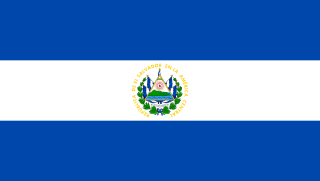
El Salvador, officially the Republic of El Salvador, is a country in Central America. It is bordered on the northeast by Honduras, on the northwest by Guatemala, and on the south by the Pacific Ocean. El Salvador's capital and largest city is San Salvador. The country's population in 2023 was estimated to be 6.5 million.

This is a demography of the population of El Salvador including population density, ethnicity, education level, health of the populace, economic status, religious affiliations and other aspects of the population.

The economy of El Salvador has experienced relatively low rates of GDP growth, in comparison to other developing countries. Rates have not risen above the low single digits in nearly two decades – part of a broader environment of macroeconomic instability which the integration of the United States dollar has done little to improve. One problem that the Salvadoran economy faces is the inequality in the distribution of income. In 2011, El Salvador had a Gini Coefficient of .485, which although similar to that of the United States, leaves 37.8% of the population below the poverty line, due to lower aggregate income. The richest 10% of the population receives approximately 15 times the income of the poorest 40%.
The Football War, also known as the Hundred Hours' War or 100 Hour War, was a brief military conflict fought between El Salvador and Honduras in 1969. Existing tensions between the two countries coincided with rioting during a 1970 FIFA World Cup qualifier. The war began on 14 July 1969 when the Salvadoran military launched an attack against Honduras. The Organization of American States (OAS) negotiated a cease-fire on the night of 18 July, which took full effect on 20 July. Salvadoran troops were withdrawn in early August. The war had major consequences for both countries and was a major factor in starting the Salvadoran Civil War a decade later.

The music of El Salvador refers to the Music of the Republic of El Salvador and is encompassed in the wider Latin American musical traditions.
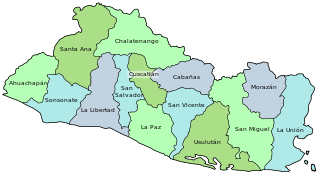
El Salvador is divided into 14 departments for administrative purposes, subdivided into 44 municipalities (municipios) and 262 districts. The country is a unitary state.
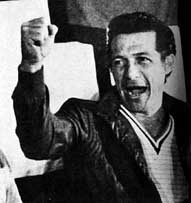
Roberto D'Aubuisson Arrieta was a Salvadoran military officer, neo-fascist politician, and death squad leader. In 1981, he co-founded and became the first leader of the far-right Nationalist Republican Alliance (ARENA) and served as president of the Legislative Assembly from 1982 to 1983. He was a presidential candidate for 1984 presidential election, losing in the second round to José Napoleón Duarte, the former president of the Revolutionary Government Junta. After ARENA's loss in the 1985 legislative elections, D'Aubuisson stepped down in favor of Alfredo Cristiani and was designated as the party's honorary president for life. D'Aubuisson was named by the United Nations' Truth Commission for El Salvador as having ordered the assassination of Óscar Romero, the archbishop of San Salvador in 1980.

The Legislative Assembly is the legislative branch of the government of El Salvador.

The culture of El Salvador is a Central American culture nation influenced by the clash of ancient Mesoamerica and medieval Iberian Peninsula. Salvadoran culture is influenced by Native American culture as well as Latin American culture. Mestizo culture and the Catholic Church dominates the country. Although the Romance language, Castilian Spanish, is the official and dominant language spoken in El Salvador, Salvadoran Spanish which is part of Central American Spanish has influences of Native American languages of El Salvador such as Lencan languages, Cacaopera language, Mayan languages and Pipil language, which are still spoken in some regions of El Salvador.

José Simeón Cañas Central American University, also known as UCA El Salvador, is a private Catholic university with nonprofit purposes in San Salvador, El Salvador. It is operated by the Society of Jesus.
The following article is a ranked list of Salvadoran departments.
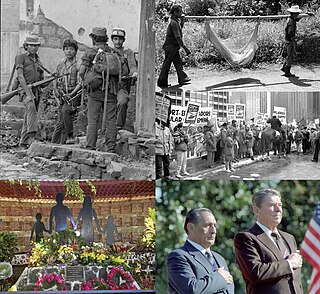
The Salvadoran Civil War was a twelve-year period of civil war in El Salvador that was fought between the government of El Salvador and the Farabundo Martí National Liberation Front (FMLN), a coalition or "umbrella organization" of left-wing groups backed by the Cuban regime of Fidel Castro as well as the Soviet Union. A coup on 15 October 1979 followed by government killings of anti-coup protesters is widely seen as the start of civil war. The war did not formally end until 16 January 1992 with the signing of the Chapultepec Peace Accords in Mexico City.
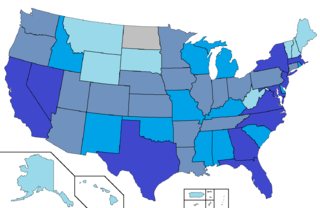
Salvadoran Americans are Americans of full or partial Salvadoran descent. As of 2021, there are 2,473,947 Salvadoran Americans in the United States, the third-largest Hispanic community by nation of ancestry. According to the Census Bureau, in 2021 Salvadorans made up 4.0% of the total Hispanic population in the United States.

Salvadoran passports are issued to citizens of El Salvador to travel outside the country.

Salvadorans, also known as Salvadorians, are citizens of El Salvador, a country in Central America. Most Salvadorans live in El Salvador, although there is also a significant Salvadoran diaspora, particularly in the United States, with smaller communities in other countries around the world.

According to the 2012 U.S. Global Leadership Report, 55% of Salvadorans approve of U.S. leadership, with 19% disapproving and 26% uncertain, the fourth-highest rating for any surveyed country in the Americas. In 2013 and 2014, according to the Pew Research Center's global attitudes survey 79% and 80% of Salvadorans viewed the United States positively respectively revealing El Salvador as one of the most pro-American nations in the world.
Salvadoran Australians are Australians of Salvadoran descent. Salvadoran immigration to Australia was caused principally by economic and political turmoil in El Salvador.

Afro Salvadorans are the descendants of the Sub-Saharan Africans brought to El Salvador via the Trans-atlantic slave trade during the colonial Spanish era.
A German Salvadoran is a Salvadoran descendant of German citizens who have adopted the two nationalities or Salvadorans who have German ancestry, there is a record of waves of German immigrants since the 19th century, later with the arrival of German refugees during the Second World War. El Salvador has important relations with Germany